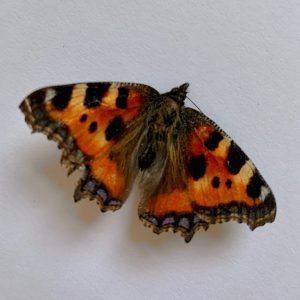Reset
‘Pass any flowering bush or tree and you can’t help but hear it, the buzz of the engine, the new life already at work in it, time’s factory.’ (Spring, Ali Smith)
I come to the end of my Lockdown Residency with Art Arcadia, but unfortunately, not the end of lockdown. We are now in the third reiteration of lockdown with no end in sight. Each one feels a bit more intransigent – the heart is a bit heavier; the mind, muscles, nerves a bit more tense. Resilience is ebbing under the weight of the prolonged threat that Coronavirus presents.
I began the residency with a paradigm I wanted to explore further; a notion that the planet is vibrating. That a deep-set alarm system had been activated alerting us that we are on the brink of irreversible change – a warning judder in the engine of existence itself. Like many, I have memories of butterfly filled gardens: Red Admirals, Painted Ladies, Small Tortoiseshells, Common Blues and Large Whites were abundant, even in the London suburb where I grew up. Hedgehogs would snuffle around the garden at night. Bats could be seen flitting in the evening skies. Such familiar occurrences have become rare – the Common Blue butterfly, for example, is no longer common. Within decades we have witnessed an unparalleled decrease in wildlife, both flora and fauna, with many species under threat.
The World Wildlife Fund (WWF) Living Planet Report 2020 recorded an average 68% decline in animal population sizes over 46 years (1970-2016) and has declared that ‘nature is unravelling’. From soil to sea to air it is evident that our planet is under severe duress. Marco Lambertini, Director General of WWF states, ‘In the midst of a global pandemic, it is now more important than ever to take unprecedented and coordinated global action to halt and reverse the loss of biodiversity and wildlife populations…’
Coronavirus is symptomatic of a deeper malaise – a flashing warning light signalling systems failure. Our relationship with the natural world, our sense of material entitlement, must change. Globally, we need to examine what is truly of value and reform the way we manufacture, consume, function and operate. We need economic, political and societal reordering. With strong, imaginative and effective governance we can turn this around. Perhaps there are lessons to be learnt from societal rebuilding, post-second world war. Despite economic depression, the NHS was born, a programme of mass affordable housing was put in place and the education system underwent transformation. Crucially, however, we need to have hope. Without hope, there is neither the will nor incentive to make change.
But, above all, we must stop and listen to the earth’s siren, hear the buzz of the engine, and nurture each and every living thing.



